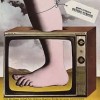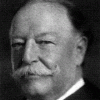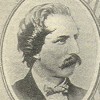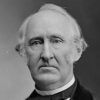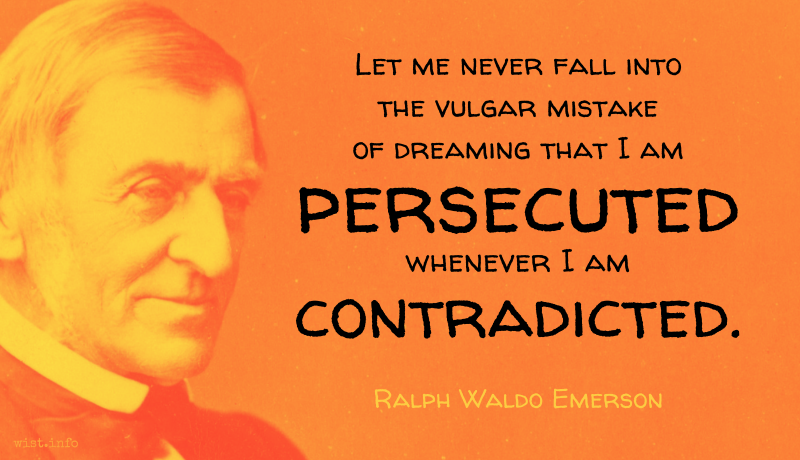It is a piece of idle sentimentality that truth, merely as truth, has any inherent power denied to error, of prevailing against the dungeon and the stake. Men are not more zealous for truth than they often are for error, and a sufficient application of legal or even of social penalties will generally succeed in stopping the propagation of either. The real advantage which truth has, consists in this, that when an opinion is true, it may be extinguished once, twice, or many times, but in the course of ages there will generally be found persons to rediscover it, until some one of its reappearances falls on a time when from favourable circumstances it escapes persecution until it has made such head as to withstand all subsequent attempts to suppress it.
Quotations about:
persecution
Note not all quotations have been tagged, so Search may find additional quotes on this topic.
But, indeed, the dictum that truth always triumphs over persecution, is one of those pleasant falsehoods which men repeat after one another till they pass into commonplaces, but which all experience refutes. History teems with instances of truth put down by persecution. If not suppressed forever, it may be thrown back for centuries.
For love of God, cheerfully endure everything — labour, sorrow, temptation, provocation, anxiety, necessity, weakness, injury and insult; censure, humiliation, disgrace, contradiction and contempt. All these things foster your growth in virtue, for they test the unproved servant of Christ, and form the jewels of his heavenly crown.
[Pro amore Dei debes omnia libenter subire , labores scilicet et dolores, tentationes et vexationes, anxietates et necessitates , infirmitates , injurias, oblocutiones , reprehensiones, humiliationes, confusiones, correctiones et despectiones. Haec juvant ad virtutem , haec probant Christi tironem, haec fabricant coelestem coronam.]
Thomas à Kempis (c. 1380-1471) German-Dutch priest, author
The Imitation of Christ [De Imitatione Christi], Book 3, ch. 5, v. 2 (3.5.2) (c. 1418-27) [tr. Sherley-Price (1952)]
(Source)
(Source (Latin)). Alternate translations:
For the love of God thou oughtest to suffer gladly all things, that is to say, all labours, sorrows, temptations, vexations, anguishes, neediness, sickness, injuries, evil sayings, reprovings, oppressions, confusions, corrections, and despisings. These help a man greatly to virtue, these prove the true knight of Christ, and make ready for him the heavenly crown.
[tr. Whitford/Raynal (1530/1871)]
You ought gladly to suffer all things for the love of God: all labors, sorrows, temptations, vexations; all anguish, need, sickness, injuries, evil sayings, reproaches; all oppressions, confusions, corrections, and despisings. These greatly help a man to virtue; these prove the true knight of Christ and prepare for him a heavenly crown.
[tr. Whitford/Gardiner (1530/1955)]
Thou oughtest for the love of God willingly to undergoe whatsoever labours, to endure whatsoever griefes, temptations, vexations, anxieties, necessities, infirmities, onjuries, detractions, reprehensions, humiliations, confusions, corrections, and contempts. These helpe to the attaining of vertue: these try a Novice of Christ, these make up an heavenly Crowne.
[tr. Page (1639), 3.35.8-9]
In obedience to his Will, you should contentedly undergo Labour and Toil, Tryals and Troubles, Distress and Anguish of Heart, Poverty and Want, Infirmities and Diseases, Injuries and Affronts, Scandal and Reproach, Disparagement and Disgrace, Punishment and Torture. These whet and brighten a Christian's Virtue, exercise and distinguish him. These Thorns are woven into Wreaths of Glory.
[tr. Stanhope (1696; 1706 ed.), 3.40]
For the love of God, therefore, thou must cheerfully and patiently endure labor and sorrow, persecution, temptation, and anxiety, poverty, and want, pain and sickness, detraction, reproof, humiliation, confusion, correction and contempt. By these the virtues of the new man Christ Jesus are exercised and strengthened; these form the ornaments of his celestial crown.
[tr. Payne (1803), 3.27.8]
For the love of God thou oughtest cheerfully to undergo all things, that is to say, all labour and pain, temptation, vexation, anxiety, necessity, infirmity, injury, obloquy, reproof, humiliation, confusion, correction, and scorn [of every kind and degree.] These help to virtue; these are the trial of a novice in Christ; these frame the heavenly Crown.
[ed. Parker (1841)]
For the love of GOD, therefore, thou must cheerfully and patiently endure all things: labour and sorrow, temptation, vexation and anxiety, poverty and want, pain and sickness, detraction, reproof, humiliation, confusion, correction, and contempt. These help to virtue; these prove "the new man in Christ Jesus; these obtain for him the celestial crown.
[tr. Dibdin (1851), 3.31.2]
Thou must be willing, for the love of God, to suffer all things, viz., labours and sorrows, temptations and vexations, anxieties, necessities, sicknesses, injuries, obloquy, reproof, humiliation, shame, correction, and contempt. These things help to obtain virtue; these prove the young soldier of Christ; these weave a heavenly crown.
[ed. Bagster (1860)]
For the love of God thou must willingly undergo all things, whether labours or sorrows, temptations, vexations, anxieties, necessities, infirmities, injuries, gainsayings, rebukes, humiliations, confusions, corrections, despisings; these things help unto virtue, these things prove the scholar of Christ; these things fashion the heavenly crown.
[tr. Benham (1874)]
For the love of God thou oughtest cheerfully to undergo all labour, grief, temptation, vexation, anxiety, necessity, infirmity, injury, detraction, reproof, humiliation, shame, correction, and scorn. These help to virtue; these are the trial of a babe in Christ; of these consist the heavenly crown.
[tr. Anon. (1901)]
For love of God you should undergo all things cheerfully, all labors and sorrows, temptations and trials, anxieties, weaknesses, necessities, injuries, slanders, rebukes, humiliations, confusions, corrections, and contempt. For these are helps to virtue. These are the trials of Christ's recruit. These form the heavenly crown.
[tr. Croft/Bolton (1940)]
For love of God you should undergo everything cheerfully: for example, toils and pains, trials, vexations, anxieties, wants, sickness, wrongs, contradictions, reproofs, humiliations, distresses, corrections, and contempt. These are aids to character: these test the soldier of Christ: these shape the heavenly crown.
[tr. Daplyn (1952)]
For the love of God you ought to endure with gladness all that befalls you: toil and sorrow, temptations, afflictions, anxiety, want, weakness, injury and slander, rebuke, humiliation, shame, correction and scorn. All these things are aids to holiness; they test the man who has newly entered the service of Christ, and go to the making of his heavenly crown.
[tr. Knox-Oakley (1959)]
For love of God you should be prepared to endure anything -- toil, pain, temptation, vexation, anxiety, need, weakness, injustice, slander, blame, humiliation, shame, censure and contempt. Such things strengthen virtue; they test the soldier of Christ and make up his heavenly crown.
[tr. Knott (1962)]
The love of God should make you put up with everything: toil and sorrow, trials, annoyance, anxiety, restriction, weakness, injury, detraction, criticism, humiliation, shame, correction and contempt. These are aids to virtue. They are tests for one newly committed to Christ. They are the things that make up the heavenly crown.
[tr. Rooney (1979)]
Certainly you should willingly endure labor and sorrows, temptations, vexations, anxieties, necessities, illnesses, injuries, contradictions, rebukes, humiliations, doubts, chastisements and contempt. These things are all aids to virtue; these test one who has begun to follow Christ; these mold a heavenly crown.
[tr. Creasy (1989)]
Unfortunately, our own colonial history also provided ample reasons for people to be afraid to vest too much power in the national government. There had been bills of attainder here; women had been convicted and sentenced to death as “witches”; Quakers, Baptists, and various Protestant sects had been persecuted from time to time. Roger Williams left Massachusetts to breathe the free air of new Rhode Island. Catholics were barred from holding office in many places. Test oaths were required in some of the colonies to bar any but “Christians” from holding office. In New England Quakers suffered death for their faith. Baptists were sent to jail in Virginia for preaching, which caused Madison, while a very young man, to deplore what he called that “diabolical hell-conceived principle of persecution.”
Hugo Black (1886-1971) American politician and jurist, US Supreme Court Justice (1937-71)
James Madison Lecture, NYU School of Law (1960-02-17)
(Source)
The inaugural Madison lecture. Reprinted as "The Bill of Rights," NYU Law Review, Vol. 35 (Apr 1960). The Madison reference is in a letter to William Bradford (24 Jan 1774).
Today most Americans seem to have forgotten the ancient evils which forced their ancestors to flee to this new country and to form a government stripped of old powers used to oppress them. But the Americans who supported the Revolution and the adoption of our Constitution knew firsthand the dangers of tyrannical governments. They were familiar with the long existing practice of English persecutions of people wholly because of their religious or political beliefs. They knew that many accused of such offenses had stood, helpless to defend themselves, before biased legislators and judges.
Hugo Black (1886-1971) American politician and jurist, US Supreme Court Justice (1937-71)
James Madison Lecture, NYU School of Law (1960-02-17)
(Source)
The inaugural Madison lecture. Reprinted as "The Bill of Rights," NYU Law Review, Vol. 35 (Apr 1960).
Every word which goes from me, whether verbally or in writing, becomes the subject of so much malignant distortion, & perverted construction, that I am obliged to caution my friends against admitting the possibility of my letters getting into the public papers, or a copy of them to be taken under any degree of confidence.
Thomas Jefferson (1743-1826) American political philosopher, polymath, statesman, US President (1801-09)
Letter to Edward Dowse (19 Apr 1803)
(Source)
Remember for me, Muse. Tell me the reasons. What pain,
what insult to her power, moved the queen of gods
to drive a man famous for piety through misery
on misery? Can such anger grip gods’ minds?[Mūsa, mihī causās memorā, quō nūmine laesō,
quidve dolēns, rēgīna deum tot volvere cāsūs
īnsīgnem pietāte virum, tot adīre labōrēs
impulerit. Tantaene animīs caelestibus īrae?]Virgil (70-19 BC) Roman poet [b. Publius Vergilius Maro; also Vergil]
The Aeneid [Ænē̆is], Book 1, l. 8ff (1.8-11) (29-19 BC) [tr. Bartsch (2021)]
(Source)
(Source (Latin)). Alternate translations:
Say Muse the cause, what God prophan'd, or why
Heaven's Queen incens'd, one fam'd for piety
Did to such royles, dangers so great compell?
What I can in heavenly minds such passions dwell?
[tr. Ogilby (1649)]
O Muse! the causes and the crimes relate;
What goddess was provok'd, and whence her hate;
For what offense the Queen of Heav'n began
To persecute so brave, so just a man;
Involv'd his anxious life in endless cares,
Expos'd to wants, and hurried into wars!
Can heav'nly minds such high resentment show,
Or exercise their spite in human woe?
[tr. Dryden (1697)]
Declare to me, O Muse! the causes, in what the deity being offended, by what the queen of heaven was provoked to drive a man of distinguished piety to struggle with so many calamities, to encounter so many hardships. Is there such resentment in heavenly minds?
[tr. Davidson/Buckley (1854)]
Say, Muse, for godhead how disdained,
Or wherefore wroth, Heaven’s queen constrained
That soul of piety so long
To turn the wheel, to cope with wrong.
Can heavenly natures nourish hate
So fierce, so blindly passionate?
[tr. Conington (1866)]
O Muse, the causes tell, for what affront,
And why incensed, the queen of gods compelled
A hero for his piety renowned
To undergo such sufferings and such toils.
Is there such anger in celestial minds?
[tr. Cranch (1872)]
Muse, tell me why, for what attaint of her deity, or in what vexation, did the Queen of heaven drive one so excellent in goodness to circle through so many afflictions, to face so many toils? Is anger so fierce in celestial spirits?
[tr. Mackail (1885)]
Say, Muse, what wound of godhead was whereby all this must come,
How grieving, she, the Queen of Gods, a man so pious drave
To win such toil, to welter on through such a troublous wave:
-- Can anger in immortal minds abide so fierce and fell?
[tr. Morris (1900)]
O Muse, assist me and inspire my song,
The various causes and the crimes relate,
For what affronted majesty, what wrong
To injured Godhead, what offence so great
Heaven's Queen resenting, with remorseless hate,
Could one renowned for piety compel
To brave such troubles, and endure the weight
Of toils so many and so huge. O tell
How can in heavenly minds such fierce resentment dwell?
[tr. Taylor (1907), st. 2]
O Muse, the causes tell! What sacrilege,
or vengeful sorrow, moved the heavenly Queen
to thrust on dangers dark and endless toil
a man whose largest honor in men's eyes
was serving Heaven? Can gods such anger feel?
[tr. Williams (1910)]
Tell me, O Muse, the cause; wherein thwarted in will or wherefore angered, did the Queen of heaven drive a man, of goodness so wondrous, to traverse so many perils, to face so many toils. Can resentment so fierce dwell in heavenly breasts?
[tr. Fairclough (1916)]
Help me, O Muse, recall the reasons: why,
Why did the queen of heaven drive a man
So known for goodness, for devotion, through
So many toils and perils? Was there slight,
Affront, or outrage? Is vindictiveness
An attribute of the celestial mind?
[tr. Humphries (1951)]
Where lay the cause of it all? How was her godhead injured?
What grievance made the queen of heaven so harry a man
Renowned for piety, through such toils, such a cycle of calamity?
Can a divine being be so persevering in anger?
[tr. Day Lewis (1952)]
Tell me the reason, Muse: what was the wound
to her divinity, so hurting her
that she, the queen of gods, compelled a man
remarkable for his goodness to endure
so many crises, meet so many trials?
Can such resentment hold the minds of gods?
[tr. Mandelbaum (1971)]
Tell me the causes now, O Muse, how galled
In her divine pride, and how sore at heart
From her old wound, the queen of gods compelled him --
A man apart, devoted to his mission --
To undergo so many perilous days
And enter on so many trials. Can anger
Black as this prey on the minds of heaven?
[tr. Fitzgerald (1981)]
Tell me, Muse, the causes of her anger. How did he violate the will of the Queen of the Gods? What was his offense? Why did she drive a man famous for his piety to such endless hardship and such suffering? Can there be so much anger in the hearts of the heavenly gods?
[tr. West (1990)]
Muse, tell me the cause: how was she offended in her divinity,
how was she grieved, the Queen of Heaven, to drive a man,
noted for virtue, to endure such dangers, to face so many
trials? Can there be such anger in the minds of the gods?
[tr. Kline (2002)]
Muse, tell me why the Queen of Heaven
Was so aggrieved, her godhead so offended,
That she forced a man of faultless devotion
To endure so much hardship. Can there be
Anger so great the hearts of gods on high?
[tr. Lombardo (2005)]
Tell me,
Muse, how it all began. Why was Juno outraged?
What could wound the Queen of the Gods with all her power?
Why did she force a man, so famous for his devotion,
to brave such rounds of hardship, bear such trials?
Can such rage inflame the immortals' hearts?
[tr. Fagles (2006)]
What is blasphemy? I will give you a definition; I will give you my thought upon this subject. What is real blasphemy?
To live on the unpaid labor of other men — that is blasphemy.
To enslave your fellow-man, to put chains upon his body — that is blasphemy.
To enslave the minds of men, to put manacles upon the brain, padlocks upon the lips — that is blasphemy.
To deny what you believe to be true, to admit to be true what you believe to be a lie — that is blasphemy.
To strike the weak and unprotected, in order that you may gain the applause of the ignorant and superstitious mob — that is blasphemy.
To persecute the intelligent few, at the command of the ignorant many — that is blasphemy.
To forge chains, to build dungeons, for your honest fellow-men — that is blasphemy.
To pollute the souls of children with the dogma of eternal pain — that is blasphemy.
To violate your conscience — that is blasphemy.
The jury that gives an unjust verdict, and the judge who pronounces an unjust sentence, are blasphemers.
The man who bows to public opinion against his better judgment and against his honest conviction, is a blasphemer.
Robert Green Ingersoll (1833-1899) American lawyer, agnostic, orator
Speech to the Jury, Trial of C. B. Reynolds for Blasphemy, Morristown, New Jersey (May 1887)
(Source)
You can stand with the lash over a man, or you can stand by the prison door, or beneath the gallows, or by the stake, and say to this man: “Recant, or the lash descends, the prison door is locked upon you, the rope is put about your neck, or the torch is given to the fagot.” And so the man recants. Is he convinced? Not at all. Have you produced a new argument? Not the slightest. And yet the ignorant bigots of this world have been trying for thousands of years to rule the minds of men by brute force. They have endeavored to improve the mind by torturing the flesh — to spread religion with the sword and torch. They have tried to convince their brothers by putting their feet in iron boots, by putting fathers, mothers, patriots, philosophers and philanthropists in dungeons. And what has been the result? Are we any nearer thinking alike to-day than we were then?
Robert Green Ingersoll (1833-1899) American lawyer, agnostic, orator
Speech to the Jury, Trial of C. B. Reynolds for Blasphemy, Morristown, New Jersey (May 1887)
(Source)
One need not go back two thousand years to the time when those who believed in the gospel of Jesus were thrown into the arena or hunted into dungeons to realize how little great beliefs or earnest believers are understood. The history of progress is written in the blood of men and women who have dared to espouse an unpopular cause, as, for instance, the black man’s right to his body, or woman’s right to her soul. If, then, from time immemorial, the New has met with opposition and condemnation, why should my beliefs be exempt from a crown of thorns?
Emma Goldman (1869-1940) Lithuanian-American anarchist, activist
“What I Believe,” New York World (19 Jul 1908)
(Source)
If we look back into history for the character of the present sects in Christianity, we shall find few that have not in their turns been persecutors, and complainers of persecution. The primitive Christians thought persecution extremely wrong in the Pagans, but practised it on one another. The first Protestants of the Church of England blamed persecution in the Romish Church, but practised it against the Puritans. These found it wrong in the bishops, but fell into the same practice themselves, both here and in New England.
Benjamin Franklin (1706-1790) American statesman, scientist, philosopher, aphorist
Letter in The London Packet (3 Jun 1772)
(Source)
Abuse is a proof that you are felt. If they praise you, you will work no revolution.
Persecution for the expression of opinions seems to me perfectly logical. If you have no doubt of your premises or your power, and want a certain result with all your heart, you naturally express your wishes in law, and sweep away all opposition. To allow opposition by speech seems to indicate that you think the speech impotent, as when a man says that he has squared the circle, or that you do not care wholeheartedly for the result, or that you doubt either your power or your premises.
But when men have realized that time has upset many fighting faiths, they may come to believe even more than they believe the very foundations of their own conduct that the ultimate good desired is better reached by free trade in ideas — that the best test of truth is the power of the thought to get itself accepted in the competition of the market, and that truth is the only ground upon which their wishes safely can be carried out.
That, at any rate, is the theory of our Constitution. It is an experiment, as all life is an experiment. Every year, if not every day, we have to wager our salvation upon some prophecy based upon imperfect knowledge. While that experiment is part of our system, I think that we should be eternally vigilant against attempts to check the expression of opinions that we loathe and believe to be fraught with death, unless they so imminently threaten immediate interference with the lawful and pressing purposes of the law that an immediate check is required to save the country.
Oliver Wendell Holmes, Jr. (1841-1935) American jurist, Supreme Court Justice
Abrams v. United States, 250 U.S. 616 (1919) [dissent]
(Source)
The essence of the Epistles of Paul is that Christians should rejoice at being deemed worthy to suffer for what they believe. The projection of a social gospel, in my opinion, is the true witness of a Christian life. This is the meaning of the true ekklesia — the inner, spiritual church. The church once changed society. It was then a thermostat of society. But today I feel that too much of the church is merely a thermometer, which measures rather than molds popular opinion.
Martin Luther King, Jr. (1929-1968) American clergyman, civil rights leader, social activist, preacher
Playboy interview (Jan 1965)
(Source)
Everyone loves a witch hunt as long as it’s someone else’s witch being hunted.
KING ARTHUR: Shut up!
DENNIS: Oh, now we see the violence inherent in the system. Come and see the violence inherent in the system! Help! Help! I’m being repressed!
KING ARTHUR: Bloody peasant!
DENNIS: Oh, what a giveaway! Did you hear that? Did you hear that, eh? That’s what I’m on about! Did you see him repressing me? You saw him, didn’t you?
Surely there is no better way to stop the rising of new sects and schisms than to reform abuses; to compound the smaller differences; to proceed mildly, and not with sanguinary persecutions; and rather to take off the principal authors by winning and advancing them, than to enrage them by violence and bitterness.
Francis Bacon (1561-1626) English philosopher, scientist, author, statesman
“Of Vicissitude of Things,” Essays, No. 58 (1625)
(Source)
I know your race. It is made up of sheep. It is governed by minorities, seldom or never by majorities. It suppresses its feelings and its beliefs and follows the handful that makes the most noise. Sometimes the noisy handful is right, sometimes wrong; but no matter, the crowd follows it. The vast majority of the race, whether savage or civilized, are secretly kind-hearted and shrink from inflicting pain, but in the presence of the aggressive and pitiless minority they don’t dare to assert themselves. Think of it! One kind-hearted creature spies upon another, and sees to it that he loyally helps in iniquities which revolt both of them. Speaking as an expert, I know that ninety-nine out of a hundred of your race were strongly against the killing of witches when that foolishness was first agitated by a handful of pious lunatics in the long ago. And I know that even to-day, after ages of transmitted prejudice and silly teaching, only one person in twenty puts any real heart into the harrying of a witch. And yet apparently everybody hates witches and wants them killed. Some day a handful will rise up on the other side and make the most noise — perhaps even a single daring man with a big voice and a determined front will do it — and in a week all the sheep will wheel and follow him, and witch-hunting will come to a sudden end.
The history of the Jews also shows that oppression and persecution are far more efficacious in binding a nation together than community of interest and national prosperity. Increase of wealth divides rather than unites a people; but suffering shared in common binds it together with hoops of steel.
There is nothing so despicable as a secret society that is based upon religious prejudice and that will attempt to defeat a man because of his religious beliefs. Such a society is like a cockroach — it thrives in the dark. So do those who combine for such an end.
Of all the animosities which have existed among mankind, those which are caused by a difference of sentiments in religion appear to be the most inveterate and distressing, and ought to be deprecated. I was in hopes that the enlightened and liberal policy, which has marked the present age, would at least have reconciled Christians of every denomination so far that we should never again see the religious disputes carried to such a pitch as to endanger the peace of society.
If I could conceive that the general government might ever be so administered as to render the liberty of conscience insecure, I beg you will be persuaded, that no one would be more zealous than myself to establish effectual barriers against the horrors of spiritual tyranny, and every species of religious persecution.
Persecution is not an original feature in any religion; but it is always the strongly marked feature of all religions established by law. Take away the law-establishment, and every religion re-assumes its original benignity.
The doctrine which, from the very first origin of religious dissensions, has been held by bigots of all sects, when condensed into a few words and stripped of rhetorical disguise, is simply this: — I am in the right, and you are in the wrong. When you are the stronger, you ought to tolerate me, for it is your duty to tolerate truth; but when I am the stronger, I shall persecute you, for it is my duty to persecute error.
Thomas Babington Macaulay (1800-1859) English writer and politician
“Sir James Mackintosh’s History of the Revolution,” Edinburgh Review (Jul 1835)
(Source)
Review of James Mackintosh, History of the Revolution in England, in 1638 (1834).
I believe we are descendid from the Puritins, who nobly fled from a land of despitism to a land of freedim, where they could not only enjoy their own religion, but prevent everybody else from enjoyin his.
[I believe we are descended from the Puritans, who nobly fled from a land of despotism to a land of freedom, where they could not only enjoy their own religion, but prevent everybody else from enjoying his.]
It always pains me greatly to discover how some Christian communities, and even consecrated persons, can tolerate different forms of enmity, division, calumny, defamation, vendetta, jealousy and the desire to impose certain ideas at all costs, even to persecutions which appear as veritable witch hunts. Whom are we going to evangelize if this is the way we act?
Francis I (b. 1936) Argentinian Catholic Pope (2013- ) [b. Jorge Mario Bergoglio]
Evangelii Gaudium, sec. 100 (24 Nov 2013)
(Source)
Every religion consists of moral precepts, & of dogmas. In the first they all agree. All forbid us to murder, steal, plunder, bear false witness Etc. and these are the articles necessary for the preservation of order, justice, & happiness in society. In their particular dogmas all differ; no two professing the same. These respect vestments, ceremonies, physical opinions, & metaphysical speculations, totally unconnected with morality, & unimportant to the legitimate objects of society. Yet these are the questions on which have hung the bitter schisms of Nazarenes, Socinians, Arians, Athanasians in former times, & now of Trinitarians, Unitarians, Catholics, Lutherans, Calvinists, Methodists, Baptists, Quakers Etc. Among the Mahometans we are told that thousands fell victims to the dispute whether the first or second toe of Mahomet was longest; & what blood, how many human lives have the words ‘this do in remembrance of me’ cost the Christian world!
We all agree in the obligation of the moral precepts of Jesus: but we schismatize & lose ourselves in subtleties about his nature, his conception maculate or immaculate, whether he was a god or not a god, whether his votaries are to be initiated by simple aspersion, by immersion, or without water; whether his priests must be robed in white, in black, or not robed at all; whether we are to use our own reason, or the reason of others, in the opinions we form, or as to the evidence we are to believe. It is on questions of this, & still less importance, that such oceans of human blood have been spilt, & whole regions of the earth have been desolated by wars & persecutions, in which human ingenuity has been exhausted in inventing new tortures for their brethren.
It is time then to become sensible how insoluble these questions are by minds like ours, how unimportant, & how mischievous; & to consign them to the sleep of death, never to be awakened from it. The varieties in the structure & action of the human mind, as in those of the body, are the work of our creator, against which it cannot be a religious duty to erect the standard of uniformity.
Thomas Jefferson (1743-1826) American political philosopher, polymath, statesman, US President (1801-09)
Letter to James Fishback [draft] (27 Sep 1809)
(Source)
Jefferson seriously dialed back his actual response, though he kept both in his files; the final letter read, in this passage:
The interests of society require the observation of those moral precepts only in which all religions agree, (for all forbid us to murder, steal, plunder, or bear false witness.) and that we should not intermeddle with the particular dogmas in which all religions differ, and which are totally unconnected with morality. in all of them we see good men, & as many in one as another. The varieties in the structure & action of the human mind as in those of the body, are the work of our creator, against which it cannot be a religious duty to erect the standard of uniformity.
Compulsion in religion is distinguished peculiarly from compulsion in every other thing. I may grow rich by art I am compelled to follow, I may recover health by medicines I am compelled to take agt. my own judgment, but I cannot be saved by a worship I disbelieve & abhor.
Thomas Jefferson (1743-1826) American political philosopher, polymath, statesman, US President (1801-09)
“Notes on Religion” (Oct 1776?)
(Source)
Labeled by Jefferson "Scraps Early in the Revolution."
What is blasphemy? I will give you a definition; I will give you my thought upon this subject. What is real blasphemy?
To live on the unpaid labor of other men — that is blasphemy.
To enslave your fellow-man, to put chains upon his body — that is blasphemy.
To enslave the minds of men, to put manacles upon the brain, padlocks upon the lips — that is blasphemy.
To deny what you believe to be true, to admit to be true what you believe to be a lie — that is blasphemy.
To strike the weak and unprotected, in order that you may gain the applause of the ignorant and superstitious mob — that is blasphemy.
To persecute the intelligent few, at the command of the ignorant many — that is blasphemy.
To forge chains, to build dungeons, for your honest fellow-men — that is blasphemy.
To pollute the souls of children with the dogma of eternal pain — that is blasphemy.
To violate your conscience — that is blasphemy.
The jury that gives an unjust verdict, and the judge who pronounces an unjust sentence, are blasphemers.
The man who bows to public opinion against his better judgment and against his honest conviction, is a blasphemer.Robert Green Ingersoll (1833-1899) American lawyer, agnostic, orator
Trial of C.B. Reynolds for blasphemy (May 1887)
(Source)
We are more apt to persecute the unfortunates than the scoundrels; the scoundrels may retaliate.
Paul Eldridge (1888-1982) American educator, novelist, poet
Maxims for a Modern Man, #952 (1965)
(Source)
True Christianity never shields itself behind majorities. Nero, and the other persecuting Roman emperors, were amply supported by majorities; and yet the pure and peaceable religion of Christ in the end triumphed over them all; and it was only when it attempted itself to enforce religion by the arm of authority, that it began to wane. A form of religion that can not live under equal and impartial laws ought to die, and sooner or later must die.
John Welch (1805-1891) American politician, jurist
Board of Education of Cincinnati v. Minor, Ohio Supreme Court (1872)
(Source)
True Christianity asks no aid from the sword of civil authority. It began without the sword, and wherever it has taken the sword it has perished by the sword. To depend on civil authority for its enforcement is to acknowledge its own weakness, which it can never afford to do. It is able to fight its own battles. Its weapons are moral and spiritual, and not carnal. Armed with these, and these alone, it is not afraid or “ashamed” to be compared with other religions, and to withstand them single-handed.
John Welch (1805-1891) American politician, jurist
Board of Education of Cincinnati v. Minor, Ohio Supreme Court (1872)
(Source)
People do these things to other people. Not just in Nazi concentration camps and in Abu Ghraib when it was run by Saddam Hussein. Americans, too, do them when they have permission. When they are told or made to feel that those over whom they have absolute power deserve to be mistreated, humiliated, tormented. They do them when they are led to believe that the people they are torturing belong to an inferior, despicable race or religion. For the meaning of these pictures is not just that these acts were performed, but that their perpetrators had no sense that there was anything wrong in what the pictures show.
For while this year it may be a Catholic against whom the finger of suspicion is pointed, in other years it has been, and may someday be again, a Jew — or a Quaker — or a Unitarian — or a Baptist. It was Virginia’s harassment of Baptist preachers, for example, that helped lead to Jefferson’s statute of religious freedom. Today I may be the victim — but tomorrow it may be you — until the whole fabric of our harmonious society is ripped at a time of great national peril.
John F. Kennedy (1917-1963) US President (1961-63)
Speech, Greater Houston Ministerial Association (12 Sep 1960)
(Source)
The last lesson a man ever learns is, that liberty of thought and speech is the right for all mankind; that the man who denies every article of our creed is to be allowed to preach just as often and just as loud as we ourselves. We have learned this, — been taught it by persecution on the question of slavery. No matter whose lips that would speak, they must be free and ungagged. Let us always remember that he does not really believe his own opinions, who dares not give free scope to his opponent. Persecution is really want of faith in our creed.
Wendell Phillips (1811-1884) American abolitionist, orator, social activist
“The Boston Mob,” speech, Antislavery Meeting, Boston (21 Oct 1855)
(Source)
"On the Twentieth Anniversary of the Mob of October 21, 1835."
To punish a man because he has committed a crime, or because he is believed, though unjustly, to have committed a crime, is not persecution. To punish a man, because we infer from the nature of some doctrine which he holds, or from the conduct of other persons who hold the same doctrines with him, that he will commit a crime, is persecution, and is, in every case, foolish and wicked.
Thomas Babington Macaulay (1800-1859) English writer and politician
“Hallam’s Constitutional History,” Edinburgh Review (Sep 1828)
(Source)
Review of Henry Hallam, The Constitutional History of England, from the Accession of Henry VII to George II (1827).
No loss of flood and lightning, no destruction of cities and temples by hostile forces of nature, has deprived man of so many noble lives and impulses as those which his intolerance has destroyed.
Let me never fall into the vulgar mistake of dreaming that I am persecuted whenever I am contradicted.
It is clear that thought is not free if the profession of certain opinions makes it impossible to earn a living.
Bertrand Russell (1872-1970) English mathematician and philosopher
“Free Thought and Official Propaganda,” lecture, South Place Institute, London (1922-03-24)
(Source)
And people wonder where I get this weird sense of humor; the universe considers me its personal cat toy. You have ANY idea what it’s like to go through life covered in cosmic cat spit?
J. Michael (Joe) Straczynski (b. 1954) American screenwriter, producer, author [a/k/a "JMS"]
irc.warnerbros.com #Babylon5 (23 Jan 1997)
(Source)
The religious persecution of the ages has been done under what was claimed to be the command of God. I distrust those people who know so well what God wants them to do, because I notice that it always coincides with their own desires.
Susan B. Anthony (1820-1906) American reformer, aboltionist, sufferagist
Address to National American Woman Suffrage Association, Washington (23-28 Jan 1896)
(Source)














